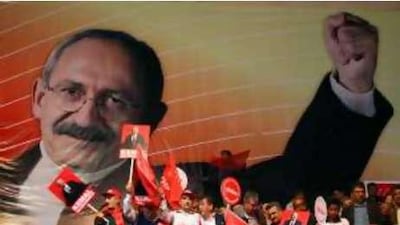ISTANBUL // He may look like a low-ranking civil servant, with his balding forehead and round spectacles, but Kemal Kilicdaroglu, nicknamed "Gandhi" by his supporters, is the new big hope of the Turkish Left.
As the freshly elected leader of the Republican People's Party, or CHP, Turkey's biggest opposition party, Mr Kilicdaroglu will challenge Recep Tayyip Erdogan, the prime minister, in next year's general election. Mr Kilicdaroglu's personal popularity and a wave of support for change within the CHP mean that Mr Erdogan's Justice and Development Party, or AKP, can no longer be sure of its leading position in Turkish politics, observers say.
"For the first time, [the AKP] has to undergo a real test in a public vote," Tarhan Erdem, a pollster and columnist for the Radikal daily, wrote. "It has to contemplate losing, while only one or two days ago it could assume it would win easily." Mr Kilicdaroglu was swept to the CHP leadership at a party congress in Ankara last weekend, raking in 1,189 of 1,250 delegate votes. At 61, the former tax and social security official and current parliamentary deputy with a reputation for honesty and modesty that has earned him his nickname, replaced Deniz Baykal, who stepped down after a recent sex scandal that some think was orchestrated by CHP members to get rid of Mr Baykal.
"I am ready," Mr Kilicdaroglu told the cheering crowd at the party congress. "The race for power has started." He said he would strengthen inner-party democracy in the CHP, which was created by modern Turkey's founder, Mustafa Kemal Ataturk, and spend much of his time with ordinary people on farms and in factories around the country. Under Mr Baykal, the CHP abandoned much of its social-democratic outlook and became the representative of hardline secularist elites in the military, judiciary and bureaucracy who accuse Mr Erdogan of pursuing a secret Islamist agenda.
At the last general election, in 2007, the CHP received roughly 21 per cent of the vote, while the AKP scored a landslide victory with almost 47 per cent. Pollsters say the CHP could do much better with a new leader. One poll, released before the party congress but after Mr Kilicdaroglu said he would run as party leader, put the CHP at over 32 per cent. The AKP's support has dwindled to about the same level.
Rusen Cakir, a columnist for the Vatan newspaper and an expert on the AKP, thinks Mr Erdogan's party is seriously worried. The fight against corruption, which Mr Kilicdaroglu has said will be one of his priorities, could turn out to be the "soft underbelly" of a party that has ruled the country since late 2002, he wrote. Ever since coming to power, the AKP has portrayed itself as the party of ordinary people, but now the unassuming Mr Kilicdaroglu, who comes from the eastern Anatolian province of Tunceli, was trying to revive the CHP's role as the party of the disadvantaged, Cakir added.
Mr Erdogan, who pointedly failed to congratulate Mr Kilicdaroglu after the CHP party congress, immediately went on the counter-attack. The CHP was insincere in its demands that the state should do more to help the underprivileged, he said. "First you come out against all social aid programmes, and then you start telling stories about the poor." Mr Kilicdaroglu's claim to fight for the poor means he must watch every step he takes. While stressing social-democratic messages during the party congress, the new opposition leader was wearing a shirt costing 495 lira (Dh1,160), a sum almost equalling the monthly wage of many Turks, media reported yesterday.
In the long run, much will depend on how much concrete change Mr Kilicdaroglu will bring to Turkey's political scene. He has said he favours a pragmatic opposition course to replace the rigidly ideological line of blanket rejection of government policies pursued by Mr Baykal. As an example, Mr Kilicdaroglu praised Mr Erdogan's recent initiative for a solution of the row surrounding Iran's nuclear programme.
But more pragmatism may not be enough. Several commentators said it would be hard for Mr Kilicdaroglu to significantly broaden the CHP's appeal without giving up some key positions held by the party under Mr Baykal. Most importantly, Mr Kilicdaroglu will have to decide whether to give up the CHP's tactics of blocking political reforms. Such a move could end the party's perceived role as spokesman for old elites opposed to democratic change and make it more attractive to reform-minded voters, but could also cause friction with traditional CHP supporters.
Ahmet Altan, editor of the independent Taraf newspaper, wrote that the CHP was in effect asking its new leader to "tell people they should stop talking about [changing] the system", but still vote for the party in larger numbers. On the issue of Turkey's bid to join the European Union, Mr Kilicdaroglu's position remained vague. The EU was "very important", he told delegates at the party congress. "But we do not accept double standards."
In a newspaper interview, Mr Kilicdaroglu criticised the EU for supporting a package of constitutional amendments passed by the AKP-dominated parliament in Ankara recently. The CHP wants the constitutional court to annul the package, which includes a judicial reform and steps to strengthen civilian control over the military. tseibert@thenational.ae

